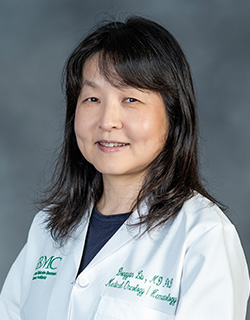Ask an Oncology Expert with Dr. Ari Elman
May 19, 2022Dr. Ari Elman is a medical oncologist in the Sandra & Malcolm Berman Cancer Institute at GBMC. He earned his medical degree from the University of Maryland School of Medicine and completed his residency in Internal Medicine at Temple University Hospital in Philadelphia, PA. He previously worked at Lankenau Medical Center in Wynnewood, PA, where he served as chief resident and as an academic hospitalist. Dr. Elman had his fellowship training in Hematology and Oncology at the University of Maryland Marlene and Stewart Greenebaum Cancer Center in Baltimore, and is board-certified in Medical Oncology, Hematology, and Internal Medicine.
On Wednesday, May 18, Dr. Ari Elman shared many interesting and informative points. As a medical oncologist and hematologist who works with six other physicians in his practice, all bring many different strengths to patient care.
Here are the main takeaways from this informative conversation:
- A medical oncologist is part of the multidisciplinary care team at GBMC. Medical oncologists treat with medication (chemotherapy, immunotherapy, etc.) and work closely with others, like surgeons and radiation oncologists, to provide a complete and individualized treatment plan for each patient. These discussions ensure each patient's unique medical history and cancer diagnosis are treated as such. Dr. Elman specializes in cancers of the urinary tract, such as kidney, bladder and prostate as well as head and neck.
- At GBMC, the course of treatment is determined based on a few criteria. The first step to treatment is a proper diagnosis. Once diagnosed and stage of cancer determined, the team factors in the patient's strength level to withstand treatment, which can include factors such as their age, physical capacity, etc. Dr. Elman explained why some patients receive only chemotherapy and some receive a combination of chemotherapy and radiation therapy. Chemotherapy can target and effect the patient's entire body, while radiation (and surgery) only target one specific area of the patient's body. Sometimes, chemotherapy will be used in advance of radiation to make the tumor more sensitive to radiation treatment.
- Dr. Elman also shared that GBMC's Clinical Trials program is a benefit to both patients and doctors. The program currently runs about 50 clinical trials and is a great way for doctors to research new treatments. Patients can receive a treatment that might not be well known or fully approved yet, and they are contributing to the future of patient care by participating.
Clinical trials and a multidisciplinary team approach to patient care are just two of the hallmarks for the Sandra and Malcolm Berman Cancer Institute at GBMC. If you wish to support the program and the resources we offer at no charge to patients, please consider a donation to the Cancer Institute.



